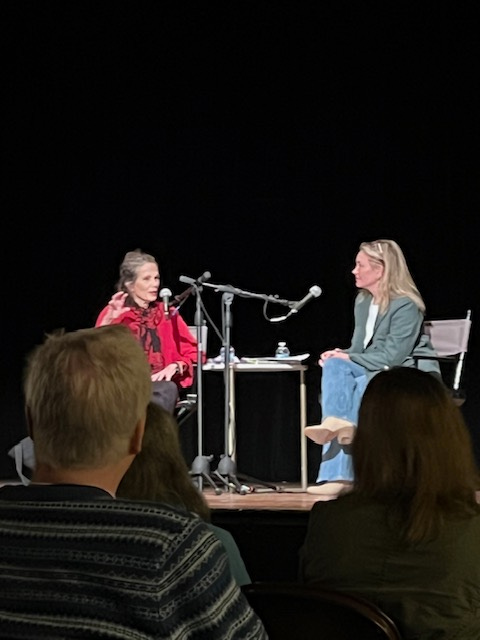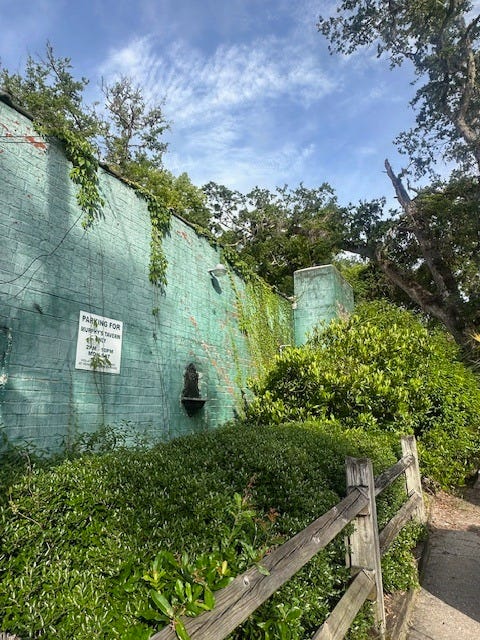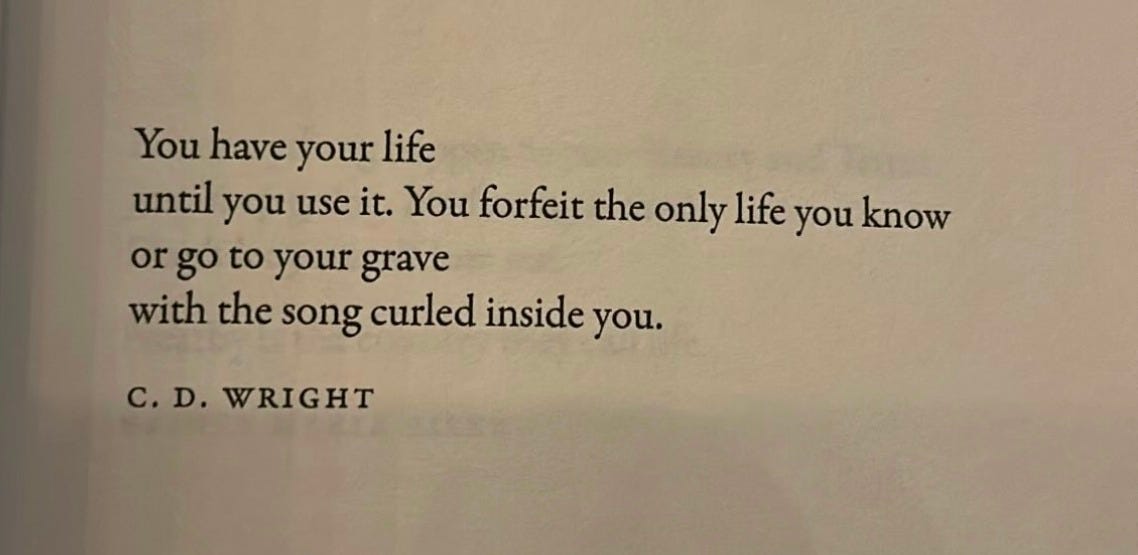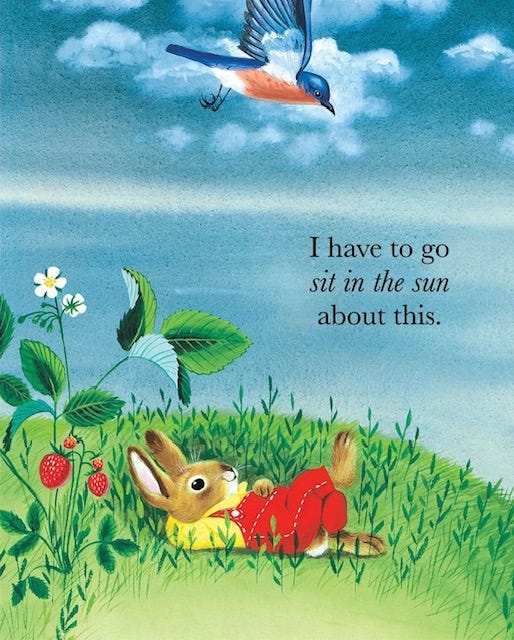The Analog Mind
Do you miss yours?
“The elasticity of imagination and compassion is what writing and reading promote,” the writer Julia Alvarez has said.
Last week I sat - a little starstruck- across from Julia on the stage at the Southern Vermont Arts Center, asking her questions about her writing life, politics, and her most recent book, The Cemetery of Untold Stories.
Once, in a response to a question I have long forgotten, Julia said: no tale tells all.
I’m a pretty experienced interviewer, but in this instance, I kept losing track of my outward energy, because so many of Julia’s phrases struck me in a way where I wanted to turn them over and pack them inside of my mind for safekeeping. (If you want to get a sense for how Julia affects you energetically, watch this PBS special.)
As we talked, I kept thinking: I love her mind.
What I loved: Her crisp thinking, tinged with compassion. Her passion for storytelling and the experiences of women. Her intelligent allowance for the supernatural and the mystery of life. Her mindful generosity towards me and the audience - always giving. Her courage for speaking so directly to life lived underneath cruel dictatorships.
Julia’s answers to my questions were long, considered, and lovely. Her anecdotes had arcs. She recited lines of poetry and prose. Sometimes she laughed. She spoke with tenderness, alluded to failures, wasn’t afraid to express sincere opinions. She recalled students she loved, and held forth on our human impulse to connect through stories.
Every time I asked a question, she appeared to reach down inside of herself and find a way to give something remarkable.
It struck me that this mind I admired felt like a mind from the Before Times. A mind not fully riddled with technology, more analog than my own. A mind that had escaped a little more of the chronic assault of social media and AI. A mind which felt beautifully human to me.
I don’t know how to fully express what I mean - but I know that lately I feel aware when I am in spaces, at events, and among people who remind me of the Before Times. Before phones and the pandemic. The times where literary readings were hushed and it felt like something was at stake. The times when we could focus, commune with grace and offer original opinions without considering how something might look and live later online. The times we read paper copies and wrote long, complex stories without reaching for quick AI fixes. The times when we could easily distinguish fact from fiction, human-produced art from machine-generated images and prose.
These people, like Alvarez, are deeper wells.
Scientists now know - through MRI scans and behavioral data - that phones are literally rotting our brains, lighting them up with information, and producing an inability to focus. You know this already - but it’s strange to me that we know better, and we do not do better - at least collectively.
As Julia and I were getting to know each other in the green room at SVAC, she asked if I had read the latest New Yorker article by Jia Tolentino, My Brain Finally Broke.
Tolentino begins: I feel a troubling kind of opacity in my brain lately—as if reality were becoming illegible, as if language were a vessel with holes in the bottom and meaning was leaking all over the floor.
As soon as I pulled the piece up, I felt as though I was reading words from the soup of my own tired brain.
*
I’ve tried for years now to be online less. I gave up Facebook long ago, and Twitter too. I rarely post on Instagram and removed the app from my phone. I write here once or twice a month. I try to leave my phone in the other room when I’m with family, keep it in my bag when I’m with friends, lock it in the car when I go walking. I meditate. But the brain-fried feeling persists.
If you have reclaimed your attention span, in what ways have you done so? How have you found more peace? I’m interested in the tactical suggestion more than the righteous.
What are the places which register to you as having Before Times energy? Where are the people?
*
These last weeks, art organization after art organization lost crucial funding. In Vermont The Governor's Institutes, the Flynn Center, and Vermont Symphony Orchestra lost significant grants which will reduce programming, opportunities, and output.
We know that the president’s understanding of art leans in a Kid Rock and Cats direction - so let me say how pleased I was to see “Memory” singer Betty Buckley - one of the president’s professed favorites - take her awkward moment of publicity and maximize it in favor of the arts, with insight, tenderness, and boldness.
When asked by the NYT about the president’s like of her voice, she said, “He’s trying to be seen and to be loved. So for a while there, I felt this kind of glimmer of hope that wouldn’t it be great if he could allow us, as theater artists, to share with him that which we know in storytelling to assist him to see things a bit differently.”
The article goes on to point out that the president is eager to destroy the National Endowment for the Arts. Buckley says:
I still have hope for an awakening of awareness of community, of humanity, of the importance of life, the importance of every one of us. I’m appalled at the tech bros who think empathy is a weakness. Art is really important, because it’s there that we express these feelings — you can feel that connection — and I feel sure that that’s why Tr*mp is moved by that song.”
Later, she emailed a sharpened point. “While I’m honored whenever my performance resonates with an audience member, I find it deeply troubling that this praise coincides with actions that undermine the very foundation of the arts in America,” she wrote. “I urge President Trump to recognize that his genuine appreciation for the arts requires more than personal enjoyment — it demands support, protection, and the courage to uphold the freedom of expression for all artists.”
What a statement.
*
It strikes me that we aren’t going to be able to create the meaningful art we need - art that can reckon deeply with this time - with our weak, tech-addled minds. Nor are we going to be able to effectively fight for our democracy or the planet. (What this recent bill does to climate protections and clean tech is unconscionable.)
Reclaiming our attention spans feels like a form of resistance at this point - in fact, I’d say it’s the critical ingredient. (Here are some tips I probably won’t follow - like, be a single-tasker.)
“For me, the writing life doesn’t just happen when I sit at the writing desk. It is a life lived with a centering principle, and mine is this: that I will pay close attention to this world I find myself in. ‘My heart keeps open house,’ was the way the poet Theodore Roethke put it in a poem. And rendering in language what one sees through the opened windows and doors of that house is a way of bearing witness to the mystery of what it is to be alive in this world.” -Julia Alvarez
Bearing witness to the mystery alongside you all -
Take care of yourselves.
xo
MMB
PS - After a few recent requests, I’m re-opening my books for Creativity Consults - one hour sessions to help you focus on directing a creative practice, career, or writing project. There’s an intake form and a zoom session, and we end with some high level outcomes. I charge $250 an hour. Some people choose to do these monthly; some do one-time check-ins.
I am not offering manuscript consultations again until I turn my own book in - so stay tuned for openings in the fall.







Thank you for writing such a a beautiful piece. I do miss my analog mind. After my brother died last summer, I took up lap swimming to calm my mind. It feels like I'm in another world when I'm underwater. It's there I can concentrate on my breathing, process my grief and think more clearly.
"What are the places which register to you as having Before Times energy?" I love this question, Megan. Here's what comes to mind: Being into a book (a hardcover or paperback), like really immersed in one; impromptu/random playtime w my kids; playing tennis... It's hard though. Wish I could trash my phone. xoxx